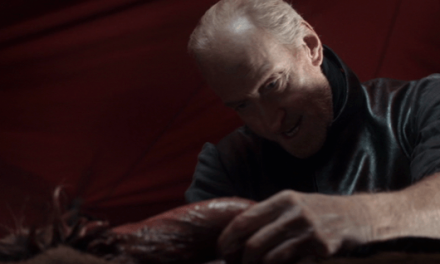[Cue Bill Paterson’s silkily smooth voiceover]
Today, The Repair Shop is visited by Jaded Academic, who has brought a precious artefact – some might say, a national treasure – in the hope that Jay and the team can restore it to its former glory.
[Jaded Academic is seen entering the comfortingly rustic, fairy light festooned environs of The Repair Shop, and is cordially met by cap-wearing host Jay Blades]
Jay: Hello, there! What can we do for you today?
Jaded: Hi, Jay. Nice hat.
Jay: What?
Jaded: Nothing.
Jay: Was there something you wanted mending?
Jaded: Er, yes. I don’t know if you’ll be able to do anything with it, but here it is…
[Fumbling inside a tweedy lecturer’s jacket, Jaded pulls out a faded and crumbling piece of what looks like ancient parchment. As Jaded gingerly places it on the table in front of Jay, a few further fragments crumble to dust]
Jaded: Sod it.
Jay: Oi! This is pre-watershed.
Jaded: Sorry.
Jay: So, what the heck is that supposed to be?
Jaded: Um… Well, actually it’s the UK Higher Education system.
Jay: The what?
Jaded: UK Higher Education. The university, um, sector, they call it now. It’s damaged.
Jay: Looks it.
Jaded: Yes, it’s not in a good way, I’m afraid. So, I wondered if you could fix it?
Jay: Well, I don’t know if we’ve got the parts. What’s it for?
Jaded: That’s a very good question. These days, nobody seems to quite know for sure.
Jay: Go on.
Jaded: Well, the government regard it as a kind of service industry, and its tuition fee-paying students as customers, whose rights are protected by the Consumer Rights Act of 2015.
Jay: Sounds fair enough.
Jaded: Hm. Well, it didn’t use to be like that; in the old days, students’ tuition fees were paid by Local Education Authorities. All they had to fork out for was their living costs – and some could get a grant for that.
Jay: Nice.
Jaded: It was nice. Very nice. But now students have to pay annual fees of £9,250, which has led to a certain sense of… well, crushing pressure on the part of some, while others display a borderline aggressive sense of entitlement.
Jay: But the customers deserve a decent service at that price, don’t they?
Jaded: Well, they’re paying for the right to study, the right to learn, and the facilities to enable that – but it’s not a degree shop.
Jay: What is it, then?
Jaded: {Sigh} It used to be an opportunity to find oneself; to develop as a person. It was as much a life experience as a course of study. These days, lots of people on both sides of the fence see it as nothing more than a sort of boot camp.
Jay: How’s that, then?
Jaded: Courses have become increasingly vocationally focused; it’s what the government wants. People don’t necessarily take a degree just because they’re interested in the subject; they want to be assured of employment in their chosen field at the end of it. This means more and more non-academics are brought in as teaching staff. You know; ex-professionals, people who used to work in industry.
Jay: Who have now discovered a passion for education?
Jaded: Uh… in some cases, yes.
Jay: Only some?
Jaded: Well. I did once listen to a presentation by an ex-TV producer who admitted that they only came into HE because of the 2008 financial crisis. They did some hourly paid work on a media course and thought, ‘I’ll have some of that!’
Jay: Blimey. And what happens to the actual academics?
Jaded: Anyone who teaches at a university can call themself an academic now, Jay.
Jay: Yeah, but the real academics? The ones who do research and publish and stuff?
Jaded: It depends where you are. At a research-focused university they will be hefted aloft on the shoulders of their peers and have acclaim, glory and rich financial rewards heaped upon them. That is, as long as they keep the research funding coming in.
Jay: I see.
Jaded: And the more heaped upon they are, the less likely it is they will have regular contact with the students. They get bought out of their teaching, and hand it on to their postgraduate students.
Jay: That’s a bit rough on the undergrads who’ve paid top dollar to study under these guys, isn’t it?
Jaded: I used to think so, but I’m more battle weary now. To be honest, I wouldn’t really know; I’m not that eminent.
Jay: And what’s it like when you’re not that eminent?
Jaded: It’s like constantly sweeping water up a hill. You get a research allocation you’re hardly ever allowed to use, and at least as much contact hour teaching as those colleagues who aren’t expected to do any research.
Jay: Bit rough, isn’t it?
Jaded: Try explaining that to management – who, as you can guess, come from industry, not academia. They’re just focused on getting as many students through the door as possible, and keeping them there. It’s called retention.
Jay: Like water retention?
Jaded: Yes, only more painful. The trouble is that lots of the students who are offered a place at these universities just don’t possess the basic skillset. Some of them haven’t written an essay in two years, and others struggle even to compose an email. The schools system has already pronounced them fit for study without actually ensuring that they they’ve got what it takes – and universities then compound that. It’s the same with international students who have passed their IELTS but can’t actually write or speak in English. But nobody acknowledges it, so of course it’s the tutors’ fault when the students don’t achieve.
Jay: And how do you deal with that?
Jaded: Well, the less scrupulous (or less competent) marker might simply inflate their students’ grades.
Jay: I don’t think we’ve got the equipment for that…
Jaded: No, you misunderstand. If an essay deserves 37%, they make it a forty so it gets a pass. It’s one way of ‘hitting management targets’.
Jay: And what about the students who do manage to pass? Doesn’t that take something away from them?
Jaded: Yes, but the chances are their grades will be inflated, too; the unfairness is evenly spread. At one place I worked we had a marking meeting, which is where tutors compare grades to ensure parity. I gave one essay out of my batch 65%, but I didn’t tell the other tutors that, and asked them what they thought it deserved. The person running the degree programme said it merited 90%, because it had a lot of references (some of which were wrong). The head of department was more realistic, and confidently advised me to give it an eighty.
Jay: And what did you say?
Jaded: That it wouldn’t get a First at the other universities I’d worked for.
Jay: And what did they say?
Jaded: “Yes, well… The students who get Firsts here probably wouldn’t get Firsts at other universities.”
Jay: Blimey.
Jaded: Quite.
Jay: Sounds rough.
Jaded: Frankly, it’s a sod.
Jay: Listen, I’ve warned you once…
Jaded: Sorry.
Jay: So, what are you hoping we’ll be able to do about it?
Jaded: I’d like you to put it back the way it was before, please. Back when it was good.
[A pause. Jay looks long and hard at the tattered remnants on his workbench]
Jay: Bit of a tall order, if I’m honest…
Jaded: Would it help if I pretended that a relative of mine had died, and that this would remind me of them?
Jay: To be honest, it makes for better television.
Jaded: Well… I’m not going to lie to you.
Jay: Shame.
Jaded: But it does feel like something special has died.
Jay: Yeah, I can see you’re in pain. Tell you what; leave it with us, and we’ll see what we can do.
Jaded: Thank you, Jay; thank you. I know you can do it. I have faith.
[As Jaded exits with a visible sense of renewed optimism, Jay looks uncertainly at the camera]
[A segue, or ellipsis, or what you will. Various other people have brought bits of old tat into the shop, and have, with surprising regularity, wept with emotion to see it restored to its former glory]
Bill P: It’s been several weeks now since Jaded brought the UK Higher Education system to the Shop for some TLC. Will Jay and the team have worked their usual magic on it?
Jaded: Hello, Jay!
Jay: All right?
Jaded: So, what have you got for me?
Jay: Well…
[Somewhat hesitantly, Jay pulls a battered suitcase from beneath the workshop table. It in no way resembles the original artefact with which Jaded presented him]
Jaded: Um?
Jay: Wait a sec…
[Slowly, Jay opens the suitcase… to reveal row upon row of crisp degree certificates, with the name spaces left blank]
Jaded: What’s this?
Jay: Well, from what you told me there wasn’t much call for that tatty old thing you brought in. So we binned it, once and for all.
Jaded: ‘Binned’ it?
Jay: Yeah. There wasn’t enough of the original left to restore, to be honest, so we just chucked the lot. Best thing, really. We thought you could use this instead; you know, take it down the market, and flog the degree things direct to the customer. Cut out the hassle.
Jaded: But I wanted you to put it back the way it was before…
Jay: No market for it, pickle. From what you said, the government doesn’t want it, and the punters don’t want it.
Jaded: Punters?
Jay: Consumers, students… whatever. And even most of your managers and colleagues don’t want it, by the sound of things. So, what was the point in us hanging onto it? Face it: it was well knackered.
Jaded: ‘Well knackered’?
Jay: Well, I could put it more strongly than that, but we’re pre-watershed…
[A pause. It is clear that Jaded wants very much to respond, but does not know how]
Jay: Are you going to cry, then? That’s the usual form at this point.
Jaded: No, I don’t think I’ll…
[Jay reaches across and slaps Jaded firmly across the face – really quite hard. Tears start immediately from Jaded’s eyes]
Jaded: How… How could you do that to me?
Jay: I reckon Higher Education could ask the same of your fellow ‘academics’. Now take your suitcase, and get out.
THE END
The above is, of course, pure fiction. Mr Blades has never, to my knowledge, assaulted anyone. Higher Education is alive and well, and the outcome suggested here in a moment of sheerest whimsy could never really happen.
Or could it?
Perhaps it could…
Jaded Academic has worked in Higher Education for several years now, and has a more than reasonable track record as a teacher and researcher. The latter have, alas, proven of little account in employment terms. Jaded has also marked far too many essays recently.





